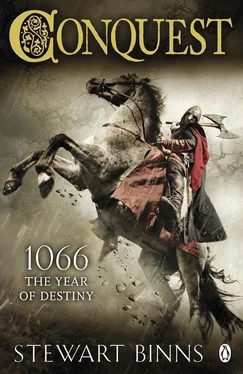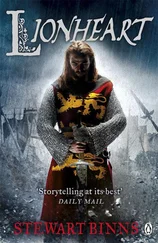There were no goodbyes in the village; he spoke to no one, not even his father. The gratitude he should have felt towards his family and his community was not there; such virtues needed a mind much more mature than Hereward’s, especially now that his was clouded by hatred and pain. He had learned a salutary lesson about fighting, but nothing about respect and humility.
Ely was a day’s ride from Bourne. He took his time; there was no need to hurry. He announced himself to everyone he met on the road. He wanted his prey to know he was coming, hoping they would feel the dread that Gythin must have experienced. He cut an impressive figure, riding tall in the saddle, dressed in the finery of a man of his station and carrying his weapons of war.
The abbey church of Ely was visible for miles around, the centrepiece of a burgh that stood but a few feet above the Great Fen which surrounded it. Its precious elevation gave it a solid footing, making it an island in an inland sea of marsh and bog. The church formed the heart of the precincts of a vast and wealthy abbey. By contrast, the burgh was a small cluster of thatched hovels with only a few grander two-storey houses for the rich merchants. It was a quiet place, enlivened only on market days when the farmers and the villagers from the surrounding countryside brought their wares.
Hereward entered the Isle of Ely across the single ancient causeway from the west. So focused was his purpose, he was oblivious to the bleakness around him. The Fens were frozen and had been for weeks in a winter that had been unusually harsh, with little respite from the hard frosts and strong gales. The desolate scene was empty and monotonous, except for a few clumps of trees on patches of high ground where snow had collected in drifts like the plumes of waves at sea. Punctuated only by black holes cut by the locals, who fished them for their larders, the smooth ice of the Fens reflected the gull-grey sky like a mirror.
Leaning into the harsh east wind, their faces covered against the chill, the few people who crossed the causeway were wrapped in heavy cloaks. Most people noticed Hereward as he passed. The deep scar on his face suggested he was a man of violence. People sensed trouble and many shied away from his pointed questions: had they seen three men, one of them a dark foreigner with a heavily studded dagger? Was the Abbot in residence?
Eventually, a wool merchant told him what he wanted to know. The three men had spent the summer carving a baptismal font for the Abbot. They were highly regarded masons from Spain and travelled the length and breadth of the country serving the great churches. They spent most of their wages visiting Edgar the Tanner, who, besides preparing hides and brewing mead and beer, ran the local whorehouse.
A strong stomach was required to visit Edgar’s establishment: the heat of the fire and the stench of humanity engulfed Hereward as he strode into the small thatched building. It was late afternoon, too early for most drinkers and for Edgar’s whores, who were still sleeping off their exertions from the night before. Only half a dozen men sat at the long oak tables. They stiffened as the visitor removed his cloak, revealing his sword and battle-axe. Hereward’s weapons gleamed as he stood in readiness.
Edgar, who had been preparing a new brew, broke the silence. ‘You’re welcome, young sir. Sit and drink with us.’
‘Thank you, sir. I seek three men. I will know them when I see them, and they will know me. I am Hereward of Bourne.’
Edgar was not a man to be awed by an eighteen-year-old boy, even one as formidable as Hereward. ‘Aren’t you a bit young to be about the Earl’s business?’
‘This is not the Earl’s business, this is my business.’
‘Sir, we live by the law here. If you have a score to settle, you should go to Earl Leofric –’
Before Edgar could finish, a dark man, whom Hereward had last seen all those months ago, stepped forward. ‘You are lucky boy, a few minutes more with me and you would be pretty gelding, but I see I leave my mark on your face. I thought I would meet you again. Now I finish what I start…’
Hereward sensed movement in the room; his two other quarries had slipped in behind him. With a quick glance over his shoulder, he saw the blades of their swords, poised ready to strike.
‘Woman was very beautiful, but she was harlot. She didn’t want to die, she beg us, took us all, but the whore didn’t make us forget our duty – we kill her anyway. We gave you beating but you heal good. It is shame your recovery has been waste of time. Are you ready to die, boy?’
There must have been a signal between the three of them, but Hereward did not see it. His two foes to the rear had each taken a full pace before he sensed their movement. He turned quickly and instinctively sank to his knees as both their swords flashed over his head. As he made his turn, he sank his axe deep into the midriff of the attacker to his left, inflicting a mortal wound, and then rose and thrust his shoulder into the side of the second man, knocking him over a nearby table. But his main adversary was already at his back, about to strike. Hereward had just enough time to halt the foreigner in his final stride by jamming the point of his blade into his throat.
His foe held only a dagger but, instead of submitting, he smiled. ‘You are quick boy… and good with axe. I hope you are also good with sword.’
The second man had regained his feet and started to circle towards Hereward, stepping over the body of his friend, now in his death throes on the floor in an ever-widening pool of blood. He had picked up a burning log from the fire and threw it at Hereward, hitting him hard on the forehead, the hot embers scorching his face. At that moment, both his foes struck: the first slashed him across his upper arm with his sword, but he parried the thrust of the leader’s dagger with his sword. Hereward turned away from danger and dropped his axe so that he could take a firm grip of the wrist of the leader, using his great strength to neutralize the danger of his dagger.
Hereward’s sword arm, although wounded, was free and he quickly put it to lethal use by plunging his blade through the chest of the second man, shocking the life out of him. He released his grip of his sword, allowing the victim – still impaled on the end of it – to fall backwards into the fire. But Hereward did not loosen his grip on the wrist of the man he most wanted to kill; now he had him at his mercy. He used his right elbow as a bludgeon to batter the Spaniard’s face, shattering his cheekbone. Then, with one hand, he held him around the neck in an unbreakable headlock and, with the other, slammed his hand relentlessly on the table until his dagger dropped to the floor.
He started to squeeze the life out of his victim, as the all-powerful adrenalin of vengeance pumped through his veins. The Spaniard was a strong man with the hands of a mason, but he could not break Hereward’s grip. Edgar the Tanner looked on in shock: Hereward’s first victim lay on the floor, his lungs slowly filling, drowning him in his own blood; the second’s lifeless body was beginning to be consumed by the open fire; and the third, the leader, was being slowly and agonizingly strangled to death.
Hereward did not look at the man, nor speak to him; he just stared into the distance, thinking of Gythin. The man struggled at first, but then his movements subsided, his face swelled and his eyes bulged as if they were going to burst. Finally, the puce of the man’s gorged face paled, his lids closed over his blood-filled eyes and his body went limp.
Hereward held on, savouring the act of retribution.
The only sounds were the spit and crackle of the fire and the gentle dribble from the man’s leggings as his bodily fluids drained away for the last time.
Читать дальше












